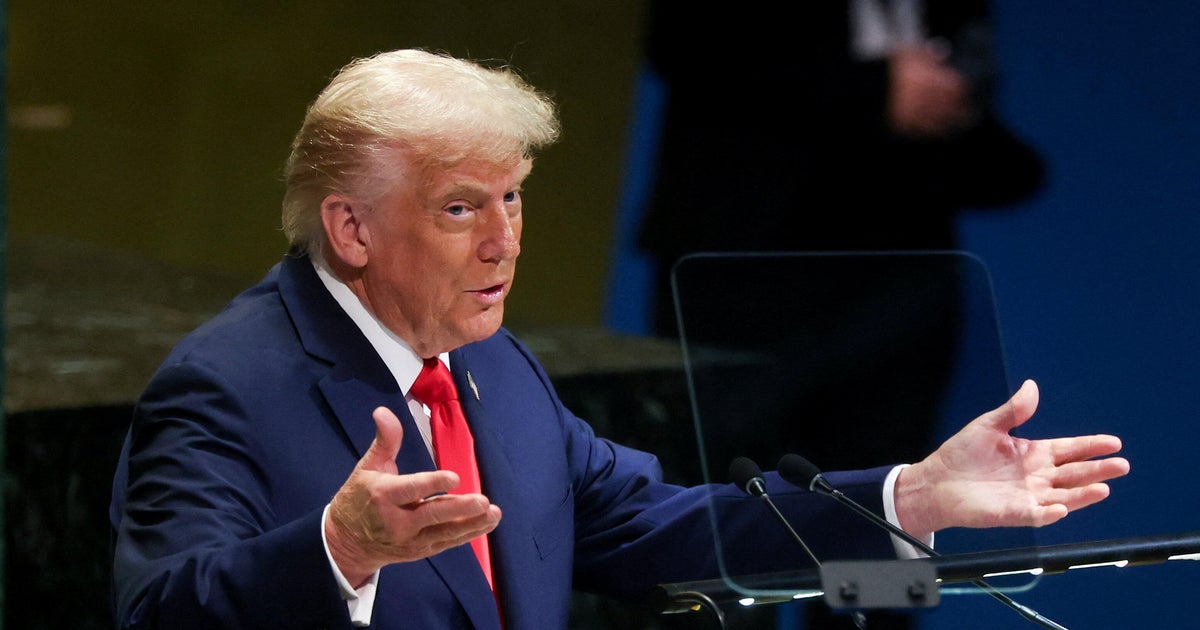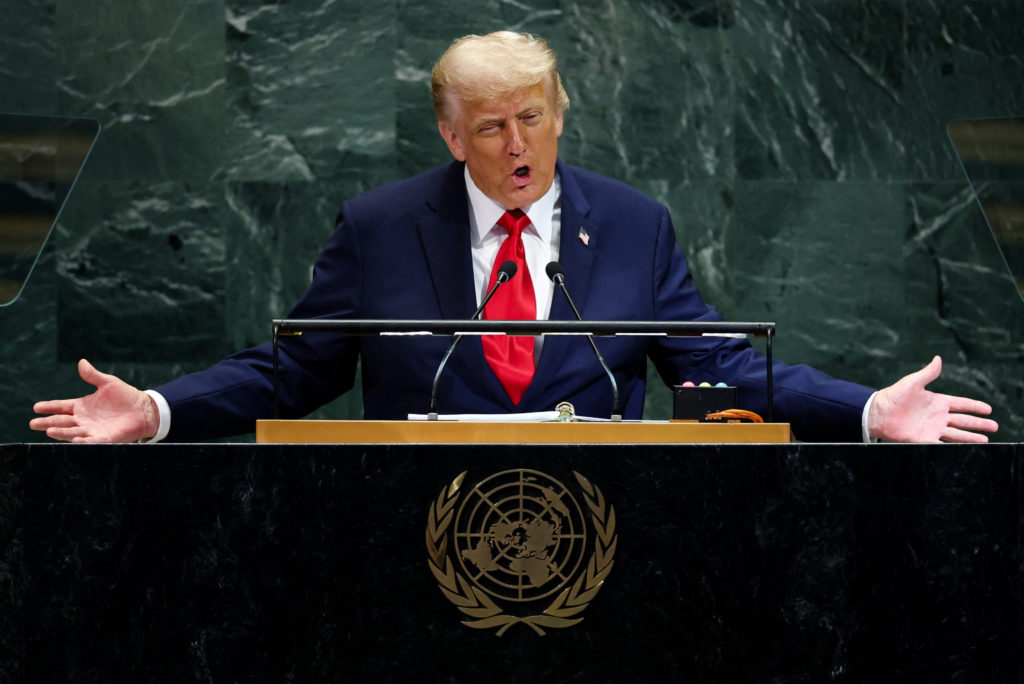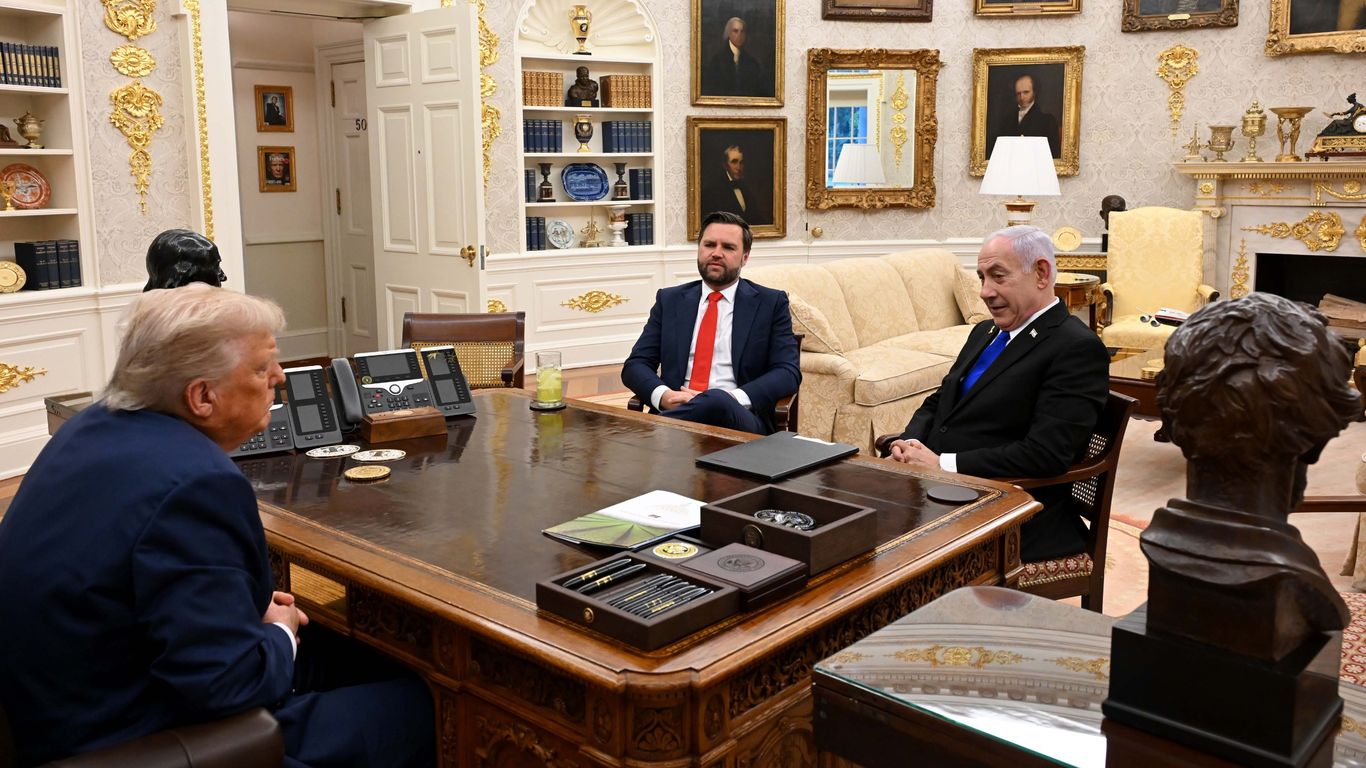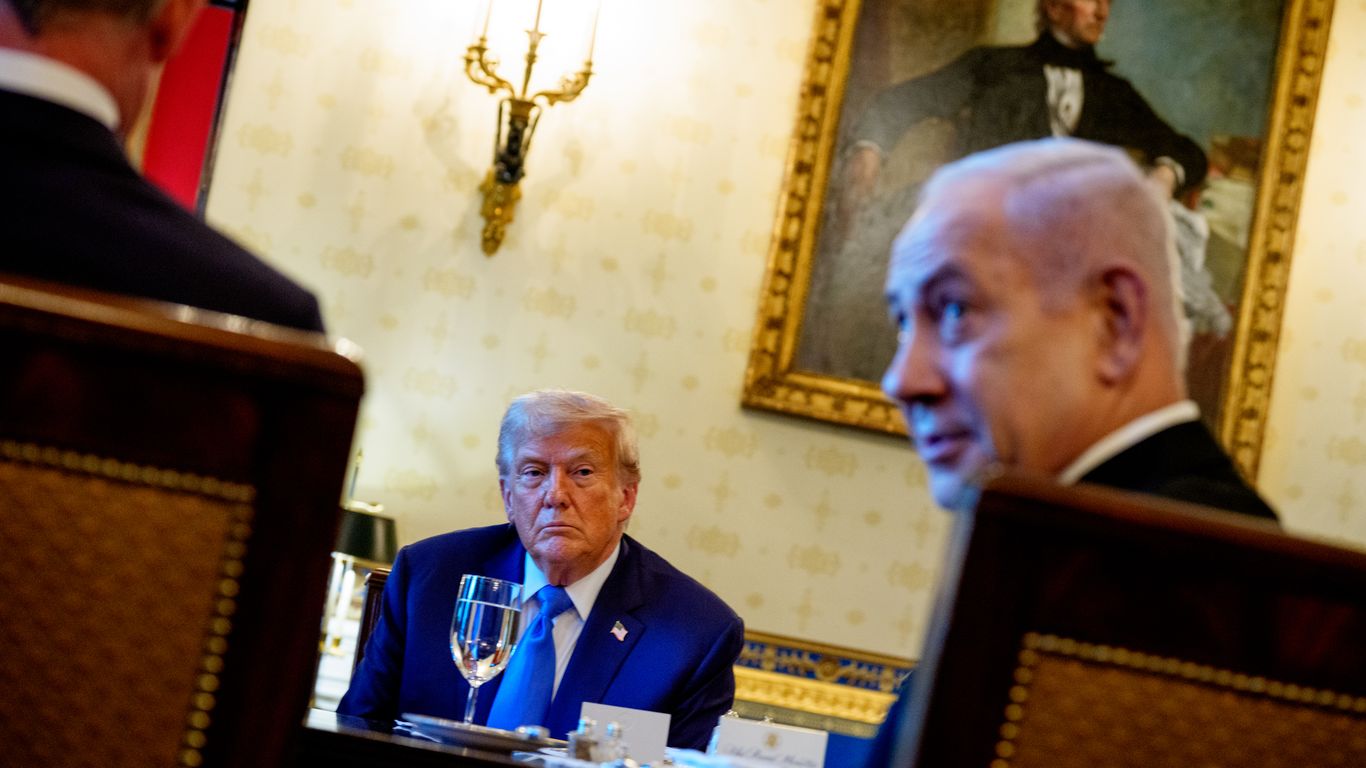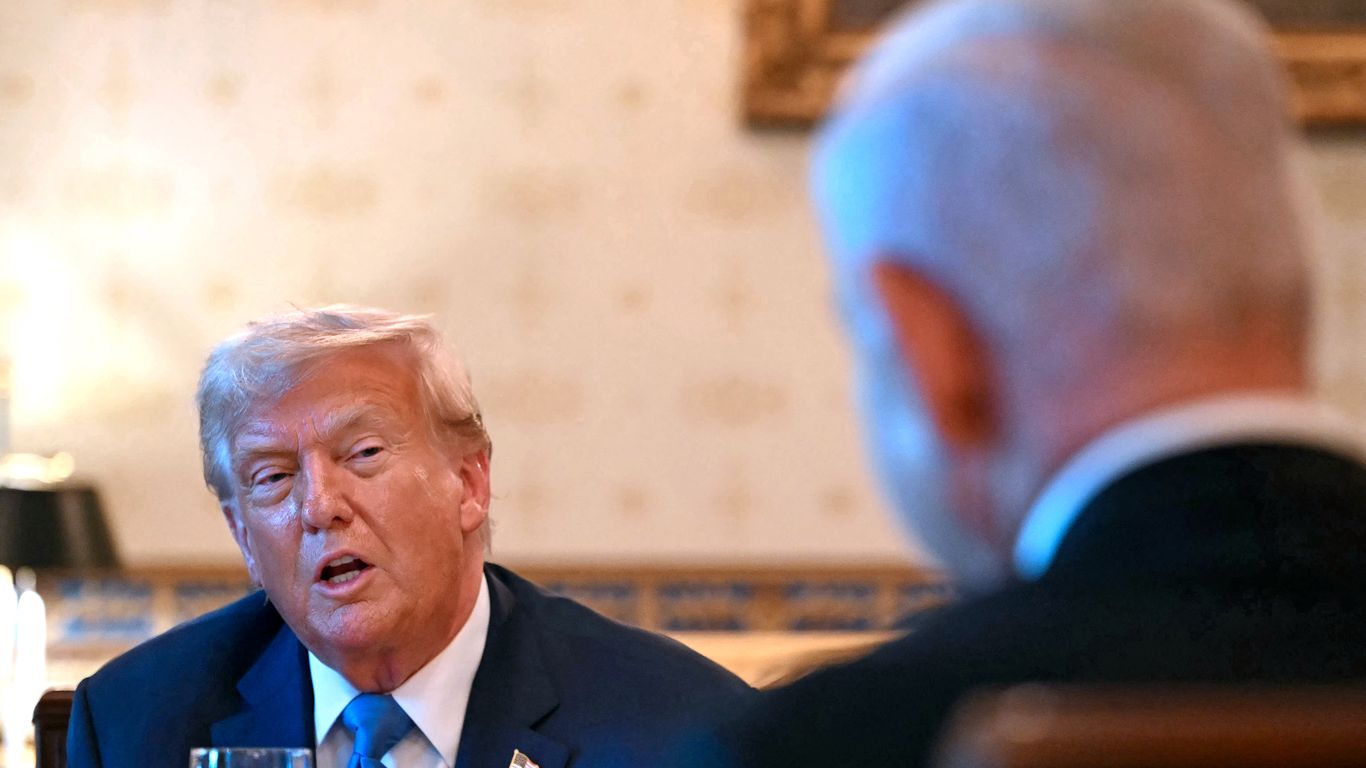Trump Opposes Israeli Annexation
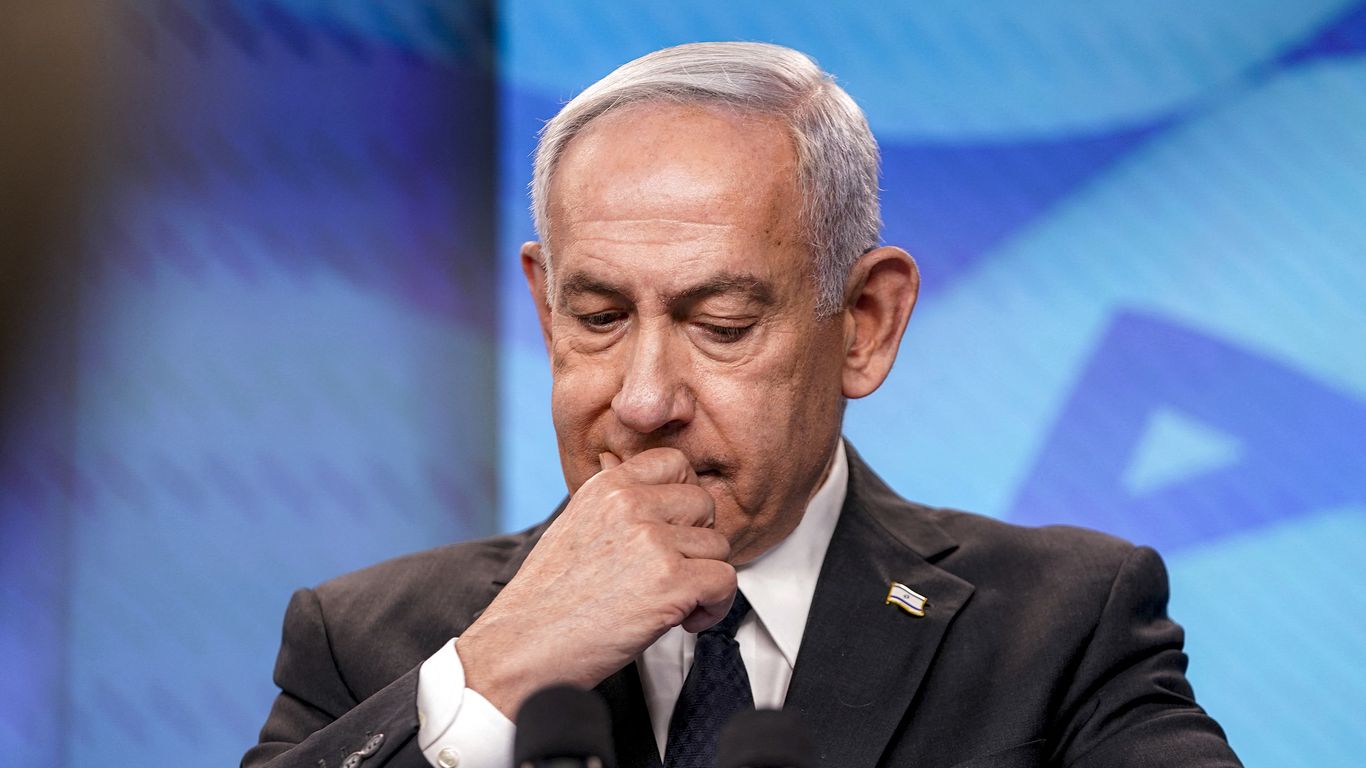
Introduction
In a recent statement, President Donald Trump made it clear that he will not allow Israeli Prime Minister Benjamin Netanyahu to annex the West Bank. This announcement comes amidst growing tensions and heightened speculation about the annexation, which has been a topic of discussion for years.
Key Details
The West Bank is a highly contested area that is currently under Israeli military occupation. The annexation of this land would essentially mean that Israel would claim full sovereignty over it, leaving Palestinians with limited rights and autonomy. Trump's remarks echo the sentiment of many international leaders who have voiced their concerns about this potential move.
However, this is not the first time that Trump has expressed opposition to Netanyahu's plans. In the past, he has made it clear that the United States does not support unilateral annexation and that any decision should be made through negotiations between Israel and Palestine.
Impact
Trump's statement not only shows his commitment to maintaining a balanced relationship with both Israel and Palestine, but it also sends a strong message to the international community about the United States' stance on the issue. The potential annexation of the West Bank has the potential to jeopardize any chances of a peaceful resolution to the ongoing conflict in the region.
Furthermore, this move could have significant implications for the relationship between the United States and Israel. With the upcoming US elections, Trump
About the People Mentioned
Donald Trump
Donald John Trump, born June 14, 1946, in Queens, New York, is an American businessman, media personality, and politician. He graduated from the University of Pennsylvania’s Wharton School in 1968 with a degree in economics. In 1971, he took over his family’s real estate business, renaming it the Trump Organization, through which he expanded into building and managing skyscrapers, hotels, casinos, and golf courses. Trump gained widespread fame as the host of the reality TV show *The Apprentice* from 2004 to 2015, which helped establish his public persona as a successful entrepreneur. Trump entered politics as a Republican and was elected the 45th president of the United States, serving from 2017 to 2021. His presidency was marked by significant policy actions including tax cuts, deregulation, the appointment of three Supreme Court justices, renegotiation of trade agreements (notably replacing NAFTA with the USMCA), and a focus on immigration control including border wall expansion. He withdrew the U.S. from international agreements such as the Paris Climate Accord and the Iran nuclear deal, and engaged in a trade war with China. His administration’s response to the COVID-19 pandemic was criticized for downplaying the virus’s severity. Trump was impeached twice by the House of Representatives—first in 2019 for abuse of power and obstruction, and again in 2021 for incitement of insurrection—but was acquitted by the Senate both times. After losing the 2020 election to Joe Biden, Trump challenged the results, culminating in the January 6, 2021, Capitol riot. He remains a central figure in American politics, having won the 2024 presidential election and returned as the 47th president in 2025, continuing to promote policies aimed at economic growth, border security, and military strength[1][2][3][4].
Benjamin Netanyahu
Benjamin Netanyahu, born on October 21, 1949, in Tel Aviv, Israel, is a prominent Israeli politician and diplomat who has served as Prime Minister of Israel three times (1996–1999, 2009–2021, and from 2022 onwards). He began his career in the Israeli military's special operations and later transitioned into politics in the late 1980s, joining the Likud party[1][2]. Netanyahu first became prime minister in 1996, during which time he signed the Hebron and Wye Accords, advancing peace efforts with the Palestinians. His administration focused on economic reforms such as government privatization, liberalizing currency regulations, and reducing deficits. After losing the 1999 election, he served as foreign minister and finance minister before reclaiming the Likud leadership in 2005[1][3][4]. Returning as prime minister in 2009, Netanyahu formed a national unity government and proposed a demilitarized Palestinian state recognizing Israel as the Jewish state, emphasizing security concerns. His tenure was marked by fluctuating peace negotiations with the Palestinians and contentious policies including settlement expansions. He also maintained a hawkish stance on Iran and supported the Iraq war[1][3][5]. In 2022, Netanyahu made a political comeback as prime minister, leading a coalition that included far-right parties. His leadership during this period has been pivotal amid the 2023–2024 Israel-Hamas conflict, with significant domestic and international implications[2]. Netanyahu is Israel’s longest-serving prime minister and remains a central figure in Israeli politics, known for his strong security policies, economic reforms, and complex role in the Israeli-Palestinian conflict. His career has been marked by both political resilience and controversy, reflecting his enduring influence on Israel’s domestic and foreign affairs[2][3][5].
About the Organizations Mentioned
United Nations
The United Nations (UN) is a pivotal international organization established in 1945, following the devastation of World War II, with the primary goal of maintaining global peace and security, fostering international cooperation, and promoting social progress. The UN Charter, signed by 51 founding member states, including the United States, the United Kingdom, China, and the Soviet Union, laid the foundation for this ambitious endeavor[1][3]. ## History and Structure The UN was born out of the failures of its predecessor, the League of Nations, which failed to prevent World War II. Key planning meetings, such as the Dumbarton Oaks Conference in 1944, defined the UN's structure, which includes the General Assembly, the Security Council, the Economic and Social Council, the Trusteeship Council, the International Court of Justice, and the Secretariat[1][6]. The Security Council, with five permanent members (the United States, China, France, Russia, and the United Kingdom), holds significant influence due to its veto power[2]. ## Key Achievements Over the years, the UN has played a crucial role in conflict resolution, human rights advocacy, and sustainable development. Notable achievements include the establishment of the Universal Declaration of Human Rights in 1948 and the implementation of numerous peacekeeping missions worldwide[3][4]. The UN has also been instrumental in addressing global challenges such as climate change and pandemics through its various programs and agencies. ## Current Status Today, the UN comprises 193 member states, with its most recent addition being South Sudan in 2011[5]. The organization continues to evolve, addressing emerging issues like digital governance and cybersecurity. Despite challenges, the UN remains a cornerstone of international diplomacy and cooperation. ## Notable Aspects The UN's work is not limited to politics; it also impacts business and technology through initiatives that promote sustainable development and digital inclusion. Its role in setting global standards and fostering international cooperation makes it a significant player in shaping the
Palestine
The **Palestine Liberation Organization (PLO)** is a key political umbrella organization founded in 1964 to unify various Palestinian groups that had operated independently, mainly as clandestine resistance movements against Israeli occupation. Its primary mission has been to represent the Palestinian people globally, particularly those displaced or living in areas affected by the Israeli-Palestinian conflict[1]. The PLO gained prominence after the 1967 Six-Day War and engaged in guerrilla warfare against Israel through the 1960s to the 1980s before transitioning to peace negotiations in the 1990s. A major milestone for the PLO was the establishment of the **Palestinian Authority (PA)** in 1994, created under the Oslo Accords in cooperation with Israel. The PA has since served as the administrative body governing parts of the West Bank[1]. The PLO remains the dominant political force within the PA, seeking to advance Palestinian self-determination and statehood. In recent years, Palestinian politics have been marked by internal divisions among factions like Hamas and Fatah, with ongoing efforts to unify these groups under a national consensus. For instance, in October 2025, multiple Palestinian organizations met in Cairo, mediated by Egypt and supported by Qatar and Turkey, to form a unified stance on Gaza's future governance, including proposals for a technocratic administration and elections, signaling a cautious shift from militant to civil governance models[2]. The international community continues to engage with the Palestinian question, promoting human rights and a two-state solution based on pre-1967 borders. The United Nations and related bodies actively support Palestinian rights and humanitarian needs, particularly amid ongoing conflicts and blockades in Gaza that have caused severe humanitarian crises[3][4]. In 2025, significant diplomatic efforts, including Security Council debates and a high-level UN conference, have focused on ceasefire implementation, Hamas disarmament, and recognition of Palestinian statehood by over 150 countries[5]. Notably, the P


